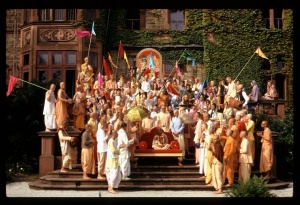CC Antya 16.27 (1975): Difference between revisions
(Vanibot #0027: CCMirror - Mirror CC's 1996 edition to form a basis for 1975) |
(Vanibot #0020: VersionCompareLinker - added a link to the Version Compare feature) |
||
| Line 2: | Line 2: | ||
<div style="float:left">'''[[Sri Caitanya-caritamrta (1975)|Śrī Caitanya-caritāmṛta (1975)]] - [[CC Antya (1975)|Antya-līlā]] - [[CC Antya 16 (1975)|Chapter 16: Lord Śrī Caitanya Mahāprabhu Tastes Nectar from the Lips of Lord Śrī Kṛṣṇa]]'''</div> | <div style="float:left">'''[[Sri Caitanya-caritamrta (1975)|Śrī Caitanya-caritāmṛta (1975)]] - [[CC Antya (1975)|Antya-līlā]] - [[CC Antya 16 (1975)|Chapter 16: Lord Śrī Caitanya Mahāprabhu Tastes Nectar from the Lips of Lord Śrī Kṛṣṇa]]'''</div> | ||
<div style="float:right">[[File:Go-previous.png|link=CC Antya 16.26 (1975)|Antya-līlā 16.26]] '''[[CC Antya 16.26 (1975)|Antya-līlā 16.26]] - [[CC Antya 16.28 (1975)|Antya-līlā 16.28]]''' [[File:Go-next.png|link=CC Antya 16.28 (1975)|Antya-līlā 16.28]]</div> | <div style="float:right">[[File:Go-previous.png|link=CC Antya 16.26 (1975)|Antya-līlā 16.26]] '''[[CC Antya 16.26 (1975)|Antya-līlā 16.26]] - [[CC Antya 16.28 (1975)|Antya-līlā 16.28]]''' [[File:Go-next.png|link=CC Antya 16.28 (1975)|Antya-līlā 16.28]]</div> | ||
{{CompareVersions|CC|Antya 16.27|CC 1975|CC 1996}} | |||
{{RandomImage}} | {{RandomImage}} | ||
==== TEXT 27 ==== | ==== TEXT 27 ==== | ||
<div class="verse"> | <div class="verse"> | ||
:aho bata śva-paco | :aho bata śva-paco 'to garīyān | ||
:yaj-jihvāgre vartate nāma tubhyam | :yaj-jihvāgre vartate nāma tubhyam | ||
:tepus tapas te juhuvuḥ sasnur āryā | :tepus tapas te juhuvuḥ sasnur āryā | ||
| Line 27: | Line 26: | ||
<div class="translation"> | <div class="translation"> | ||
"My dear Lord, anyone who always keeps Your holy name on his tongue is greater than an initiated brāhmaṇa. Although he may be born in a family of dog-eaters and therefore, by material calculations, be the lowest of men, he is glorious nevertheless. That is the wonderful power of chanting the holy name of the Lord. One who chants the holy name is understood to have performed all kinds of austerities. He has studied all the Vedas, he has performed all the great sacrifices mentioned in the Vedas, he has already taken his bath in all the holy places of pilgrimage, and it is he who is factually the Āryan.' " | |||
</div> | </div> | ||
Latest revision as of 22:58, 26 January 2020

A.C. Bhaktivedanta Swami Prabhupada
TEXT 27
- aho bata śva-paco 'to garīyān
- yaj-jihvāgre vartate nāma tubhyam
- tepus tapas te juhuvuḥ sasnur āryā
- brahmānūcur nāma gṛṇanti ye te
SYNONYMS
aho bata—how wonderful it is; śva-pacaḥ—a dog-eater; ataḥ—than the initiated brāhmaṇa; garīyān—more glorious; yat—of whom; jihvā-agre—on the tip of the tongue; vartate—remains; nāma—the holy name; tubhyam—of You, my Lord; tepuḥ—have performed; tapaḥ—austerity; te—they; juhuvuḥ—have performed sacrifices; sasnuḥ—have bathed in all holy places; āryāḥ—actually belonging to the Āryan race; brahma—all the Vedas; anūcuḥ—have studied; nāma—the holy name; gṛṇanti—chant; ye—who; te—they.
TRANSLATION
"My dear Lord, anyone who always keeps Your holy name on his tongue is greater than an initiated brāhmaṇa. Although he may be born in a family of dog-eaters and therefore, by material calculations, be the lowest of men, he is glorious nevertheless. That is the wonderful power of chanting the holy name of the Lord. One who chants the holy name is understood to have performed all kinds of austerities. He has studied all the Vedas, he has performed all the great sacrifices mentioned in the Vedas, he has already taken his bath in all the holy places of pilgrimage, and it is he who is factually the Āryan.' "